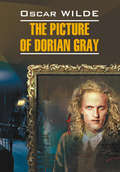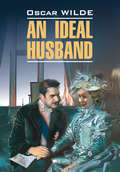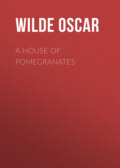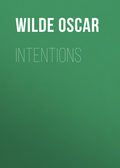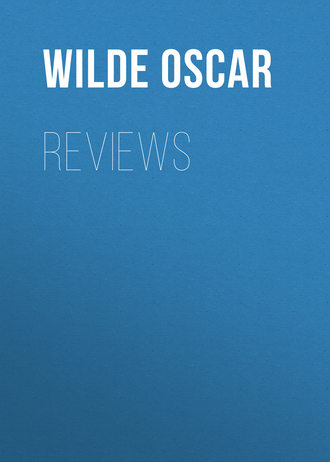
Оскар Уайльд
Reviews
THREE NEW POETS
(Pall Mall Gazette, July 12, 1889.)
Books of poetry by young writers are usually promissory notes that are never met. Now and then, however, one comes across a volume that is so far above the average that one can hardly resist the fascinating temptation of recklessly prophesying a fine future for its author. Such a book Mr. Yeats’s Wanderings of Oisin certainly is. Here we find nobility of treatment and nobility of subject-matter, delicacy of poetic instinct and richness of imaginative resource. Unequal and uneven much of the work must be admitted to be. Mr. Yeats does not try to ‘out-baby’ Wordsworth, we are glad to say; but he occasionally succeeds in ‘out-glittering’ Keats, and, here and there, in his book we come across strange crudities and irritating conceits. But when he is at his best he is very good. If he has not the grand simplicity of epic treatment, he has at least something of the largeness of vision that belongs to the epical temper. He does not rob of their stature the great heroes of Celtic mythology. He is very naïve and very primitive and speaks of his giants with the air of a child. Here is a characteristic passage from the account of Oisin’s return from the Island of Forgetfulness:
And I rode by the plains of the sea’s edge, where all is barren and grey,
Grey sands on the green of the grasses and over the dripping trees,
Dripping and doubling landward, as though they would hasten away
Like an army of old men longing for rest from the moan of the seas.
Long fled the foam-flakes around me, the winds fled out of the vast,
Snatching the bird in secret, nor knew I, embosomed apart,
When they froze the cloth on my body like armour riveted fast,
For Remembrance, lifting her leanness, keened in the gates of my heart.
Till fattening the winds of the morning, an odour of new-mown hay
Came, and my forehead fell low, and my tears like berries fell down;
Later a sound came, half lost in the sound of a shore far away,
From the great grass-barnacle calling, and later the shore-winds brown.
If I were as I once was, the gold hooves crushing the sand and the shells,
Coming forth from the sea like the morning with red lips murmuring a song,
Not coughing, my head on my knees, and praying, and wroth with the bells,
I would leave no Saint’s head on his body, though spacious his lands were and strong.
Making way from the kindling surges, I rode on a bridle-path,
Much wondering to see upon all hands, of wattle and woodwork made,
Thy bell-mounted churches, and guardless the sacred cairn and the earth,
And a small and feeble populace stooping with mattock and spade.
In one or two places the music is faulty, the construction is sometimes too involved, and the word ‘populace’ in the last line is rather infelicitous; but, when all is said, it is impossible not to feel in these stanzas the presence of the true poetic spirit.
A young lady who seeks for a ‘song surpassing sense,’ and tries to reproduce Mr. Browning’s mode of verse for our edification, may seem to be in a somewhat parlous state. But Miss Caroline Fitz Gerald’s work is better than her aim. Venetia Victrix is in many respects a fine poem. It shows vigour, intellectual strength, and courage. The story is a strange one. A certain Venetian, hating one of the Ten who had wronged him and identifying his enemy with Venice herself, abandons his native city and makes a vow that, rather than lift a hand for her good, he will give his soul to Hell. As he is sailing down the Adriatic at night, his ship is suddenly becalmed and he sees a huge galley
where sate
Like counsellors on high, exempt, elate,
The fiends triumphant in their fiery state,
on their way to Venice. He has to choose between his own ruin and the ruin of his city. After a struggle, he determines to sacrifice himself to his rash oath.
I climbed aloft. My brain had grown one thought,
One hope, one purpose. And I heard the hiss
Of raging disappointment, loth to miss
Its prey – I heard the lapping of the flame,
That through the blenchèd figures went and came,
Darting in frenzy to the devils’ yell.
I set that cross on high, and cried: ‘To hell
My soul for ever, and my deed to God!
Once Venice guarded safe, let this vile clod
Drift where fate will!’
And then (the hideous laugh
Of fiends in full possession, keen to quaff
The wine of one new soul not weak with tears,
Pealing like ruinous thunder in mine ears)
I fell, and heard no more. The pale day broke
Through lazar-windows, when once more I woke,
Remembering I might no more dare to pray.
Venetia Victrix is followed by Ophelion, a curious lyrical play whose dramatis personæ consist of Night, Death, Dawn and a Scholar. It is intricate rather than musical, but some of the songs are graceful – notably one beginning
Lady of heaven most pure and holy,
Artemis, fleet as the flying deer,
Glide through the dusk like a silver shadow,
Mirror thy brow in the lonely mere.
Miss Fitz Gerald’s volume is certainly worth reading.
Mr. Richard Le Gallienne’s little book, Volumes in Folio as he quaintly calls it, is full of dainty verse and delicate fancy. Lines such as
And lo! the white face of the dawn
Yearned like a ghost’s against the pane,
A sobbing ghost amid the rain;
Or like a chill and pallid rose
Slowly upclimbing from the lawn, strike,
with their fantastic choice of metaphors, a pleasing note. At present Mr. Le Gallienne’s muse seems to devote herself entirely to the worship of books, and Mr. Le Gallienne himself is steeped in literary traditions, making Keats his model and seeking to reproduce something of Keats’s richness and affluence of imagery. He is keenly conscious how derivative his inspiration is:
Verse of my own! why ask so poor a thing,
When I might gather from the garden-ways
Of sunny memory fragrant offering
Of deathless blooms and white unwithering sprays?
Shakspeare had given me an English rose,
And honeysuckle Spenser sweet as dew,
Or I had brought you from that dreamy close
Keats’ passion-blossom, or the mystic blue
Star-flower of Shelley’s song, or shaken gold
From lilies of the Blessed Damosel,
Or stolen fire from out the scarlet fold
Of Swinburne’s poppies..
Yet now that he has played his prelude with so sensitive and so graceful a touch, we have no doubt that he will pass to larger themes and nobler subject-matter, and fulfil the hope he expresses in this sextet:
For if perchance some music should be mine,
I would fling forth its notes like a fierce sea,
To wash away the piles of tyranny,
To make love free and faith unbound of creed.
O for some power to fill my shrunken line,
And make a trumpet of my oaten reed.
(1) The Wanderings of Oisin and Other Poems. By W. B. Yeats. (Kegan Paul.)
(2) Venetia Victrix. By Caroline Fitz Gerald. (Macmillan and Co.)
(3) Volumes in Folio. By Richard Le Gallienne. (Elkin Mathews.)
A CHINESE SAGE
(Speaker, February 8, 1890.)
A eminent Oxford theologian once remarked that his only objection to modern progress was that it progressed forward instead of backward – a view that so fascinated a certain artistic undergraduate that he promptly wrote an essay upon some unnoticed analogies between the development of ideas and the movements of the common sea-crab. I feel sure the Speaker will not be suspected even by its most enthusiastic friends of holding this dangerous heresy of retrogression. But I must candidly admit that I have come to the conclusion that the most caustic criticism of modern life I have met with for some time is that contained in the writings of the learned Chuang Tzŭ, recently translated into the vulgar tongue by Mr. Herbert Giles, Her Majesty’s Consul at Tamsui.
The spread of popular education has no doubt made the name of this great thinker quite familiar to the general public, but, for the sake of the few and the over-cultured, I feel it my duty to state definitely who he was, and to give a brief outline of the character of his philosophy.
Chuang Tzŭ, whose name must carefully be pronounced as it is not written, was born in the fourth century before Christ, by the banks of the Yellow River, in the Flowery Land; and portraits of the wonderful sage seated on the flying dragon of contemplation may still be found on the simple tea-trays and pleasing screens of many of our most respectable suburban households. The honest ratepayer and his healthy family have no doubt often mocked at the dome-like forehead of the philosopher, and laughed over the strange perspective of the landscape that lies beneath him. If they really knew who he was, they would tremble. For Chuang Tzŭ spent his life in preaching the great creed of Inaction, and in pointing out the uselessness of all useful things. ‘Do nothing, and everything will be done,’ was the doctrine which he inherited from his great master Lao Tzŭ. To resolve action into thought, and thought into abstraction, was his wicked transcendental aim. Like the obscure philosopher of early Greek speculation, he believed in the identity of contraries; like Plato, he was an idealist, and had all the idealist’s contempt for utilitarian systems; he was a mystic like Dionysius, and Scotus Erigena, and Jacob Böhme, and held, with them and with Philo, that the object of life was to get rid of self-consciousness, and to become the unconscious vehicle of a higher illumination. In fact, Chuang Tzŭ may be said to have summed up in himself almost every mood of European metaphysical or mystical thought, from Heraclitus down to Hegel. There was something in him of the Quietist also; and in his worship of Nothing he may be said to have in some measure anticipated those strange dreamers of mediæval days who, like Tauler and Master Eckhart, adored the purum nihil and the Abyss. The great middle classes of this country, to whom, as we all know, our prosperity, if not our civilisation, is entirely due, may shrug their shoulders over all this and ask, with a certain amount of reason, what is the identity of contraries to them, and why they should get rid of that self-consciousness which is their chief characteristic. But Chuang Tzŭ was something more than a metaphysician and an illuminist. He sought to destroy society, as we know it, as the middle classes know it; and the sad thing is that he combines with the passionate eloquence of a Rousseau the scientific reasoning of a Herbert Spencer. There is nothing of the sentimentalist in him. He pities the rich more than the poor, if he ever pities at all, and prosperity seems to him as tragic a thing as suffering. He has nothing of the modern sympathy with failures, nor does he propose that the prizes should always be given on moral grounds to those who come in last in the race. It is the race itself that he objects to; and as for active sympathy, which has become the profession of so many worthy people in our own day, he thinks that trying to make others good is as silly an occupation as ‘beating a drum in a forest in order to find a fugitive.’ It is a mere waste of energy. That is all. While, as for a thoroughly sympathetic man, he is, in the eyes of Chuang Tzŭ, simply a man who is always trying to be somebody else, and so misses the only possible excuse for his own existence.
Yes; incredible as it may seem, this curious thinker looked back with a sigh of regret to a certain Golden Age when there were no competitive examinations, no wearisome educational systems, no missionaries, no penny dinners for the people, no Established Churches, no Humanitarian Societies, no dull lectures about one’s duty to one’s neighbour, and no tedious sermons about any subject at all. In those ideal days, he tells us, people loved each other without being conscious of charity, or writing to the newspapers about it. They were upright, and yet they never published books upon Altruism. As every man kept his knowledge to himself, the world escaped the curse of scepticism; and as every man kept his virtues to himself, nobody meddled in other people’s business. They lived simple and peaceful lives, and were contented with such food and raiment as they could get. Neighbouring districts were in sight, and ‘the cocks and dogs of one could be heard in the other,’ yet the people grew old and died without ever interchanging visits. There was no chattering about clever men, and no laudation of good men. The intolerable sense of obligation was unknown. The deeds of humanity left no trace, and their affairs were not made a burden for posterity by foolish historians.
In an evil moment the Philanthropist made his appearance, and brought with him the mischievous idea of Government. ‘There is such a thing,’ says Chuang Tzŭ, ‘as leaving mankind alone: there has never been such a thing as governing mankind.’ All modes of government are wrong. They are unscientific, because they seek to alter the natural environment of man; they are immoral because, by interfering with the individual, they produce the most aggressive forms of egotism; they are ignorant, because they try to spread education; they are self-destructive, because they engender anarchy. ‘Of old,’ he tells us, ‘the Yellow Emperor first caused charity and duty to one’s neighbour to interfere with the natural goodness of the heart of man. In consequence of this, Yao and Shun wore the hair off their legs in endeavouring to feed their people. They disturbed their internal economy in order to find room for artificial virtues. They exhausted their energies in framing laws, and they were failures.’ Man’s heart, our philosopher goes on to say, may be ‘forced down or stirred up,’ and in either case the issue is fatal. Yao made the people too happy, so they were not satisfied. Chieh made them too wretched, so they grew discontented. Then every one began to argue about the best way of tinkering up society. ‘It is quite clear that something must be done,’ they said to each other, and there was a general rush for knowledge. The results were so dreadful that the Government of the day had to bring in Coercion, and as a consequence of this ‘virtuous men sought refuge in mountain caves, while rulers of state sat trembling in ancestral halls.’ Then, when everything was in a state of perfect chaos, the Social Reformers got up on platforms, and preached salvation from the ills that they and their system had caused. The poor Social Reformers! ‘They know not shame, nor what it is to blush,’ is the verdict of Chuang Tzŭ upon them.
The economic question, also, is discussed by this almond-eyed sage at great length, and he writes about the curse of capital as eloquently as Mr. Hyndman. The accumulation of wealth is to him the origin of evil. It makes the strong violent, and the weak dishonest. It creates the petty thief, and puts him in a bamboo cage. It creates the big thief, and sets him on a throne of white jade. It is the father of competition, and competition is the waste, as well as the destruction, of energy. The order of nature is rest, repetition, and peace. Weariness and war are the results of an artificial society based upon capital; and the richer this society gets, the more thoroughly bankrupt it really is, for it has neither sufficient rewards for the good nor sufficient punishments for the wicked. There is also this to be remembered – that the prizes of the world degrade a man as much as the world’s punishments. The age is rotten with its worship of success. As for education, true wisdom can neither be learnt nor taught. It is a spiritual state, to which he who lives in harmony with nature attains. Knowledge is shallow if we compare it with the extent of the unknown, and only the unknowable is of value. Society produces rogues, and education makes one rogue cleverer than another. That is the only result of School Boards. Besides, of what possible philosophic importance can education be, when it serves simply to make each man differ from his neighbour? We arrive ultimately at a chaos of opinions, doubt everything, and fall into the vulgar habit of arguing; and it is only the intellectually lost who ever argue. Look at Hui Tzu. ‘He was a man of many ideas. His works would fill five carts. But his doctrines were paradoxical.’ He said that there were feathers in an egg, because there were feathers on a chicken; that a dog could be a sheep, because all names were arbitrary; that there was a moment when a swiftly-flying arrow was neither moving nor at rest; that if you took a stick a foot long, and cut it in half every day, you would never come to the end of it; and that a bay horse and a dun cow were three, because taken separately they were two, and taken together they were one, and one and two made up three. ‘He was like a man running a race with his own shadow, and making a noise in order to drown the echo. He was a clever gadfly, that was all. What was the use of him?’
Morality is, of course, a different thing. It went out of fashion, says Chuang Tzŭ, when people began to moralise. Men ceased then to be spontaneous and to act on intuition. They became priggish and artificial, and were so blind as to have a definite purpose in life. Then came Governments and Philanthropists, those two pests of the age. The former tried to coerce people into being good, and so destroyed the natural goodness of man. The latter were a set of aggressive busybodies who caused confusion wherever they went. They were stupid enough to have principles, and unfortunate enough to act up to them. They all came to bad ends, and showed that universal altruism is as bad in its results as universal egotism. They ‘tripped people up over charity, and fettered them with duties to their neighbours.’ They gushed over music, and fussed over ceremonies. As a consequence of all this, the world lost its equilibrium, and has been staggering ever since.
Who, then, according to Chuang Tzŭ, is the perfect man? And what is his manner of life? The perfect man does nothing beyond gazing at the universe. He adopts no absolute position. ‘In motion, he is like water. At rest, he is like a mirror. And, like Echo, he answers only when he is called upon.’ He lets externals take care of themselves. Nothing material injures him; nothing spiritual punishes him. His mental equilibrium gives him the empire of the world. He is never the slave of objective existences. He knows that, ‘just as the best language is that which is never spoken, so the best action is that which is never done.’ He is passive, and accepts the laws of life. He rests in inactivity, and sees the world become virtuous of itself. He does not try to ‘bring about his own good deeds.’ He never wastes himself on effort. He is not troubled about moral distinctions. He knows that things are what they are, and that their consequences will be what they will be. His mind is the ‘speculum of creation,’ and he is ever at peace.
All this is of course excessively dangerous, but we must remember that Chuang Tzŭ lived more than two thousand years ago, and never had the opportunity of seeing our unrivalled civilisation. And yet it is possible that, were he to come back to earth and visit us, he might have something to say to Mr. Balfour about his coercion and active misgovernment in Ireland; he might smile at some of our philanthropic ardours, and shake his head over many of our organised charities; the School Board might not impress him, nor our race for wealth stir his admiration; he might wonder at our ideals, and grow sad over what we have realised. Perhaps it is well that Chuang Tzŭ cannot return.
Meanwhile, thanks to Mr. Giles and Mr. Quaritch, we have his book to console us, and certainly it is a most fascinating and delightful volume. Chuang Tzŭ is one of the Darwinians before Darwin. He traces man from the germ, and sees his unity with nature. As an anthropologist he is excessively interesting, and he describes our primitive arboreal ancestor living in trees through his terror of animals stronger than himself, and knowing only one parent, the mother, with all the accuracy of a lecturer at the Royal Society. Like Plato, he adopts the dialogue as his mode of expression, ‘putting words into other people’s mouths,’ he tells us, ‘in order to gain breadth of view.’ As a story-teller he is charming. The account of the visit of the respectable Confucius to the great Robber Chê is most vivid and brilliant, and it is impossible not to laugh over the ultimate discomfiture of the sage, the barrenness of whose moral platitudes is ruthlessly exposed by the successful brigand. Even in his metaphysics, Chuang Tzŭ is intensely humorous. He personifies his abstractions, and makes them act plays before us. The Spirit of the Clouds, when passing eastward through the expanse of air, happened to fall in with the Vital Principle. The latter was slapping his ribs and hopping about: whereupon the Spirit of the Clouds said, ‘Who are you, old man, and what are you doing?’ ‘Strolling!’ replied the Vital Principle, without stopping, for all activities are ceaseless. ‘I want to know something,’ continued the Spirit of the Clouds. ‘Ah!’ cried the Vital Principle, in a tone of disapprobation, and a marvellous conversation follows, that is not unlike the dialogue between the Sphinx and the Chimera in Flaubert’s curious drama. Talking animals, also, have their place in Chuang Tzŭ’s parables and stories, and through myth and poetry and fancy his strange philosophy finds musical utterance.
Of course it is sad to be told that it is immoral to be consciously good, and that doing anything is the worst form of idleness. Thousands of excellent and really earnest philanthropists would be absolutely thrown upon the rates if we adopted the view that nobody should be allowed to meddle in what does not concern him. The doctrine of the uselessness of all useful things would not merely endanger our commercial supremacy as a nation, but might bring discredit upon many prosperous and serious-minded members of the shop-keeping classes. What would become of our popular preachers, our Exeter Hall orators, our drawing-room evangelists, if we said to them, in the words of Chuang Tzŭ, ‘Mosquitoes will keep a man awake all night with their biting, and just in the same way this talk of charity and duty to one’s neighbour drives us nearly crazy. Sirs, strive to keep the world to its own original simplicity, and, as the wind bloweth where it listeth, so let Virtue establish itself. Wherefore this undue energy?’ And what would be the fate of governments and professional politicians if we came to the conclusion that there is no such thing as governing mankind at all? It is clear that Chuang Tzŭ is a very dangerous writer, and the publication of his book in English, two thousand years after his death, is obviously premature, and may cause a great deal of pain to many thoroughly respectable and industrious persons. It may be true that the ideal of self-culture and self-development, which is the aim of his scheme of life, and the basis of his scheme of philosophy, is an ideal somewhat needed by an age like ours, in which most people are so anxious to educate their neighbours that they have actually no time left in which to educate themselves. But would it be wise to say so? It seems to me that if we once admitted the force of any one of Chuang Tzŭ’s destructive criticisms we should have to put some check on our national habit of self-glorification; and the only thing that ever consoles man for the stupid things he does is the praise he always gives himself for doing them. There may, however, be a few who have grown wearied of that strange modern tendency that sets enthusiasm to do the work of the intellect. To these, and such as these, Chuang Tzŭ will be welcome. But let them only read him. Let them not talk about him. He would be disturbing at dinner-parties, and impossible at afternoon teas, and his whole life was a protest against platform speaking. ‘The perfect man ignores self; the divine man ignores action; the true sage ignores reputation.’ These are the principles of Chuang Tzŭ.
Chuang Tzŭ: Mystic, Moralist, and Social Reformer. Translated from the Chinese by Herbert A. Giles, H.B.M.’s Consul at Tamsui. (Bernard Quaritch.)



